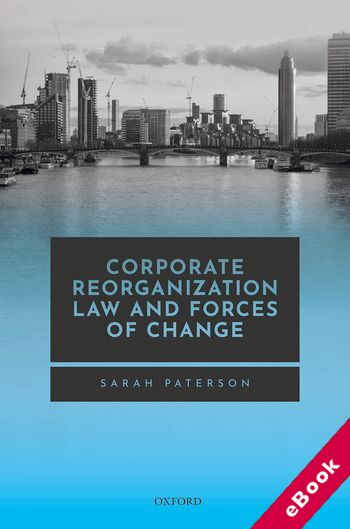
The device(s) you use to access the eBook content must be authorized with an Adobe ID before you download the product otherwise it will fail to register correctly.
For further information see https://www.wildy.com/ebook-formats
Once the order is confirmed an automated e-mail will be sent to you to allow you to download the eBook.
All eBooks are supplied firm sale and cannot be returned. If you believe there is a fault with your eBook then contact us on ebooks@wildy.com and we will help in resolving the issue. This does not affect your statutory rights.
Corporate Reorganization Law and Forces of Change argues that significant shifts in logics, practices, and identities in the finance and non-financial corporate fields can change the nature of the problem which corporate reorganization law is required to solve, so that corporate reorganization law is mobilized and adapted by the participants in the process in new and diverse ways. This book argues that, whichever theoretical or policy approach is engaged, these adaptations cannot all be evaluated using a single universal or fixed conceptual framework.
Adopting a comparative US/UK approach, the book undertakes a detailed analysis of six forces of change which developed in the finance and non-financial corporate fields from the 1980s. It analyses the ways in which these forces of change affected the nature of the corporate reorganization case, and the new ways in which participants in the corporate reorganization process mobilized and adapted corporate reorganization law in response. It argues that it is crucial to analyse the specific adaptations of corporate reorganization law which emerged from this process of change. This demands that corporate reorganization law theorists or policy makers do not start their analysis using a conceptual framework developed in response to historical adaptations of corporate reorganization law. It is necessary, instead, to identify how dominant theoretical or policy concerns manifest themselves in the specific adaptation of corporate reorganization law which is under review and to adapt conceptual frameworks accordingly.
This is a timely analysis. Just as the book is going to press, governments around the world have been forced to enact shut down measures to contain the Covid-19 threat. The book draws a distinction between adaptations of corporate reorganization law to reorganize complex, leveraged capital structures and other adaptations to reorganize a mixture of financial and other liabilities. It unpacks why it is necessary to adapt conceptual frameworks in different ways for these different types of case. This provides a way for scholars, practitioners, judges, and the legislature to think about corporate reorganization law when it is mobilized and adapted to meet the specific challenges posed for business by the Covid-19 shutdown.